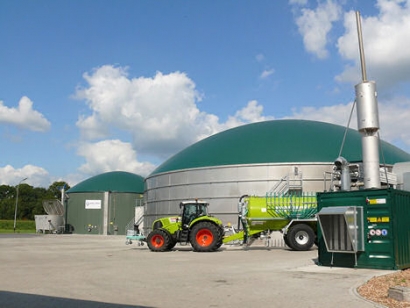
First, in the grid, power from regenerative sources is given priority over conventional power. Second, the feed-in tariffs determined by the government for the supply of renewable energies establishes investment security for the market actors.
The developments of the past 20 years confirm the success of the EEG: Since the law went into force, the share of renewable energies in the gross power consumption in Germany has continually increased, from 6.2% in 2000 to 42.1% in 2019. Accordingly, 244 billion kWh are generated from solar energy, wind, water and biomass.
Bioenergy accounts for 11% of this figure. In the field of heat generation, renewable energies account for a share of 39%, some 34% of which are based on bioenergy.
“In Germany, regenerative energies are the number one power source, and the whole world has come to view the EEG as an effective instrument for the systematic, publicly approved expansion,” underlines Jens Albartus, director of the German biogas plan manufacturer WELTEC BIOPOWER.
“Moreover, the law and its adaptations to new market conditions have constantly brought about new technologies that have become an indispensable element of many profitable energy plants,“ Albartus continued.
Innovation, in particular, is the driver of the global expansion of renewable energies, in which German companies play a key role. Since it was founded back in 2001, WELTEC advanced from a pioneer in the biogas industry to a key actor in the energy reform. With its sustainable technologies and basic values, the biogas specialist is successful around the globe and makes an important contribution to environmental protection.
For instance, the company‘s success is evident from its exports, which are above the industry average: Over the years, the company has planned and set up more than 300 plants in 25 countries on five continents. Moreover, WELTEC has invested more than €100 million in its own biogas plants throughout Germany.
“To perpetuate the success story and secure jobs in this industry, we must now increasingly turn our attention to the existing anaerobic digestion plants in Germany and urgently find smart follow-up solutions, especially for those whose 20-year EEG subsidisation will end in the coming years,” said Albartus.
“The effort is surely worth it, as biogas does not depend on wind and sunshine and therefore constitutes a key pillar in the renewable energy mix. Moreover, biomethane – i.e. refined biogas – serves as an important, carbon-neutral and sustainable fuel in the traffic reform," he explained, adding, “To engage in research that culminates in innovations that also benefit the development of international projects, we need a strong German market."

